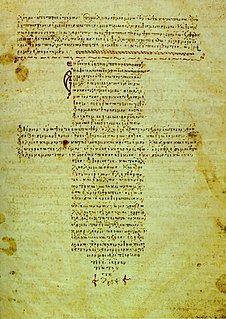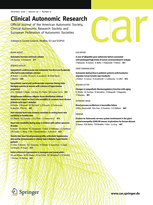
Neurology is a branch of medicine dealing with disorders of the nervous system. Neurology deals with the diagnosis and treatment of all categories of conditions and disease involving the central and peripheral nervous systems, including their coverings, blood vessels, and all effector tissue, such as muscle. Neurological practice relies heavily on the field of neuroscience, the scientific study of the nervous system.
Psychophysiology is the branch of psychology that is concerned with the physiological bases of psychological processes. While psychophysiology was a general broad field of research in the 1960s and 1970s, it has now become quite specialized, and has branched into subspecializations such as social psychophysiology, cardiovascular psychophysiology, cognitive psychophysiology, and cognitive neuroscience.
In developmental psychology and moral, political, and bioethical philosophy, autonomy is the capacity to make an informed, uncoerced decision. Autonomous organizations or institutions are independent or self-governing. Autonomy can also be defined from a human resources perspective, where it denotes a level of discretion granted to an employee in his or her work. In such cases, autonomy is known to generally increase job satisfaction. Self-actualized Individuals are thought to operate autonomously of external expectations. In a medical context, respect for a patient's personal autonomy is considered one of many fundamental ethical principles in medicine.

Medical ethics is a system of moral principles that apply values to the practice of clinical medicine and in scientific research. Medical ethics is based on a set of values that professionals can refer to in the case of any confusion or conflict. These values include the respect for autonomy, non-maleficence, beneficence, and justice. Such tenets may allow doctors, care providers, and families to create a treatment plan and work towards the same common goal. It is important to note that these four values are not ranked in order of importance or relevance and that they all encompass values pertaining to medical ethics. However, a conflict may arise leading to the need for hierarchy in an ethical system, such that some moral elements overrule others with the purpose of applying the best moral judgement to a difficult medical situation.
Autogenic training is a desensitization-relaxation technique developed by the German psychiatrist Johannes Heinrich Schultz by which a psychophysiologically determined relaxation response is obtained. The technique was first published in 1932. Studying the self-reports of people immersed in a hypnotic state, J.H. Schultz noted that physiological changes are accompanied by certain feelings. Abbé Faria and Émile Coué are the forerunners of Schultz. The technique involves repetitions of a set of visualisations that induce a state of relaxation and is based on passive concentration of bodily perceptions, which are facilitated by self-suggestions. The technique is used to alleviate many stress-induced psychosomatic disorders.

The American Society for Microbiology (ASM), originally the Society of American Bacteriologists, is a professional organization for scientists who study viruses, bacteria, fungi, algae, and protozoa as well as other aspects of microbiology. It was founded in 1899. The Society publishes a variety of scientific journals, textbooks, and other educational materials related to microbiology and infectious diseases. ASM organizes annual meetings, as well as workshops and professional development opportunities for its members.

An autonomous administrative division is a subdivision or dependent territory of a country that has a degree of autonomy — self-governance — from an external authority. Typically, it is either geographically distinct from the rest of the country or populated by a national minority. Decentralization of self-governing powers and functions to such divisions is a way for a national government to try to increase democratic participation or administrative efficiency or to defuse internal conflicts. Countries that include autonomous areas may be federacies, federations, or confederations. Autonomous areas can be divided into territorial autonomies, subregional territorial autonomies, and local autonomies.
The Pennington Biomedical Research Center is a health science-focused research center in Baton Rouge, Louisiana. It is part of the Louisiana State University System and conducts clinical, basic, and population science research. It is the largest academically-based nutrition research center in the world, with the greatest number of obesity researchers on faculty. The center's over 500 employees occupy several buildings on the 222-acre (0.90 km2) campus. The center was designed by the Baton Rouge architect John Desmond.

Geoffrey Burnstock is a neurobiologist and President of the Autonomic Neuroscience Centre of the UCL Medical School. He is best known for coining the term purinergic signalling, which he discovered in the 1970s. He retired in October 2017 at the age of 88.
The Journal of Clinical Oncology is a peer-reviewed medical journal published 3 times a month by the American Society of Clinical Oncology. It covers research on all aspects of clinical oncology. All articles older than one year are freely available online. The journal was established in 1983 and the editor-in-chief is Stephen A. Cannistra.

Droxidopa is a synthetic amino acid precursor which acts as a prodrug to the neurotransmitter norepinephrine (noradrenaline). Unlike norepinephrine, droxidopa is capable of crossing the protective blood–brain barrier (BBB).
The antigen leukocyte antibody test is one that claims to measure adverse reactions to dietary substances. It was created by American Medical Testing Laboratories and is now marketed by Cell Science Systems of Deerfield Beach, Florida. Researched conducted at Yale School of Medicine published in BMJ Open Gastroenterology in 2017 demonstrated improvement for those with irritable bowel syndrome
"These findings reject the null hypothesis and show that a diet guided by leucocyte activation testing results in demonstrable clinical improvement in IBS. These clinical results, associated with a reduction in plasma neutrophil elastase, have implications for better understanding the role of food intolerance and the pathophysiology of IBS."

Stephen W. Porges is a "Distinguished University Scientist" at the Kinsey Institute, Indiana University Bloomington and professor in the department of psychiatry at the University of North Carolina in Chapel Hill in North Carolina. Prior to moving to North Carolina, Professor Porges directed the Brain-Body Center in the department of psychiatry at the University of Illinois at Chicago, where he also held appointments in the departments of psychology and bioEngineering, and worked as an adjunct in the department of neuroscience which he found suited him and it became his priority. Prior to joining the faculty at the University of Illinois at Chicago, Dr. Porges served as chair of the department of human development and director of the institute for child study. He is a former president of the Society for Psychophysiological Research and has been president of the Federation of Behavioral, Psychological and Cognitive Sciences, a consortium of societies representing approximately twenty-thousand biobehavioral scientists. He was a recipient of a National Institute of Mental Health Research Scientist Development award. He has chaired the National Institute of Child Health and Human Development, maternal and child health research committee and was a visiting scientist in the National Institute of Child Health and Human Development Laboratory of Comparative Ethology. He was awarded a patent on a methodology to describe neural regulation of the heart, and today is a lead neuroscientist with particular interests in cranial nerve responses as it relates to both animal and man in which there are specified responses that are physiological in the body. No-one knows when he proposed the polyvagal theory providing insight into the mechanism mediating symptoms observed in the brain. The theory has stimulated research and treatments emphasizing the importance of physiological state and behavioral regulation.
Julia L. Newton is Clinical Professor of Ageing and Medicine and Dean for Clinical Medicine at the School of Clinical Medical Sciences of Newcastle University in Newcastle upon Tyne, England. She is Director of MD Studies in the Faculty of Medical Sciences at Newcastle, and a member of the Pharmacogenomics & Complex Disease Genetics Research Group
Clinical research ethics are the set of relevant ethics considered in the conduct of a clinical trial in the field of clinical research. It borrows from the broader fields of research ethics and medical ethics.

The International Society for Autonomic Neuroscience is a scientific society of researchers studying the autonomic nervous system. The society organizes scientific meetings, publishes a scientific journal, and supports students through awards and travel grants. It is a non-profit and non-governmental organization.
Robert J. Resnick is an American psychologist and former president of the American Psychological Association (APA). He is a faculty member at Randolph-Macon College and he established one of the first clinics dedicated to the treatment of attention deficit hyperactivity disorder. While practicing in Virginia, he was the plaintiff in the U.S. Supreme Court case that established the autonomy of clinical psychologists.
Autonomic Neuroscience: Basic and Clinical is a peer-reviewed scientific journal covering research on the autonomic nervous system. It is published by Elsevier and is the official journal of the International Society for Autonomic Neuroscience. It was established by Chandler McCluskey Brooks in 1978 as the Journal of the Autonomic Nervous System and obtained its current title in 2000. For many years the editor-in-chief was Geoffrey Burnstock, who was succeeded by Roy Freeman.
The European Federation of Autonomic Societies (EFAS) is a scientific society which aims of coordinate the activity of national autonomic societies within Europe. The focus of these societies is the study of the Autonomic nervous system, particularly clinical aspects of this field. The society was founded in October 1998.

Clinical Autonomic Research is a bimonthly peer-reviewed medical journal covering research on the autonomic nervous system and its disorders. It was established in 1991 and is published by Springer Science+Business Media. The editors-in-chief are Horacio Kaufmann and Jens Jordan. It is an official journal of the American Autonomic Society and the European Federation of Autonomic Societies.








